-
ORIGINAL ARTICLE09-06-2024
Adherence to sepsis protocol in a high-risk maternity reference center
Revista Brasileira de Enfermagem. 2024;77(4):e20230453
Abstract
ORIGINAL ARTICLEAdherence to sepsis protocol in a high-risk maternity reference center
Revista Brasileira de Enfermagem. 2024;77(4):e20230453
DOI 10.1590/0034-7167-2023-0453
Views0See moreABSTRACT
Objective:
To describe the adherence to the sepsis protocol by obstetric nurses in the obstetric triage of a high-risk maternity reference center.
Methods:
This was a quantitative, documental, and retrospective study involving 105 pregnant women treated in obstetric triage under sepsis criteria. Data were collected through electronic medical records using structured forms and were organized into tables employing descriptive statistics. This research adhered to ethical principles concerning human studies.
Results:
Of the checklists for initiating the SEPSIS protocol by obstetric nurses, 105 were identified. Regarding the protocol steps performed, lactate was collected in 97.1% of cases and blood cultures in 98.1%, antibiotic therapy was administered in 94.3%, and hydration was carried out in 51.4% of the cases.
Conclusion:
The initiation of the sepsis protocol for all women meeting the criteria was confirmed. However, the steps were not fully implemented as recommended by the institutional protocol, and the recommended broad-spectrum antibiotic was not administered.
-
ORIGINAL ARTICLE09-06-2024
Physical and psychological changes of the COVID-19 infodemic by the older adult population
Revista Brasileira de Enfermagem. 2024;77(4):e20230339
Abstract
ORIGINAL ARTICLEPhysical and psychological changes of the COVID-19 infodemic by the older adult population
Revista Brasileira de Enfermagem. 2024;77(4):e20230339
DOI 10.1590/0034-7167-2023-0339
Views0See moreABSTRACT
Objective:
to analyze the physical and psychological changes of the COVID-19 infodemic for the older adult population of Rio de Janeiro.
Method:
a cross-sectional, web-based survey to find out about access to news and information about COVID-19 among older adult in Rio de Janeiro, between July and December 2020. Univariate analysis and bivariate analysis were carried out using non-parametric statistical methods.
Results:
390 older adults took part, predominantly female (75.1%), aged between 66 and 75 (35.4%), married (51.0%), white (60.3%), owning their own home (81.8%), located in urban areas (91%), with complete or incomplete primary education (31.8%) and retired or pensioners (79.2%). Younger people were significantly affected both physically and psychologically by social networks when compared to television (<0.001).
Conclusion:
Physical and psychological changes from exposure to information about COVID-19 have affected the lives of the older adult, having an impact on this population.
-
ORIGINAL ARTICLE09-06-2024
Nursing Process implementation in a gerontogeriatric context: qualitative research
Revista Brasileira de Enfermagem. 2024;77(4):e20230465
Abstract
ORIGINAL ARTICLENursing Process implementation in a gerontogeriatric context: qualitative research
Revista Brasileira de Enfermagem. 2024;77(4):e20230465
DOI 10.1590/0034-7167-2023-0465
Views0See moreABSTRACT
Objective:
to describe Nursing Process implementation in a faith-based senior living community.
Method:
strategic action research with 19 nursing professionals and three managers of a faith-based senior living community. Implementation took place in four phases: diagnosis, planning, implementation and assessment. The data collected through semi-structured interviews and focus groups were subjected to discursive textual analysis.
Results:
the central categories were constructed: Nursing Process in faith-based senior living community: diagnosis of knowledge and application; Nursing Process in faith-based senior living community: implementation; Nursing process in faith-based senior living community: assessment after its implementation.
Conclusion:
Nursing Process implementation made it possible to structure work management/organization, contributing to knowledge, organization and continuity of care for safety and professional support.
-
ORIGINAL ARTICLE09-06-2024
Development and content validation of a risk classification instrument
Revista Brasileira de Enfermagem. 2024;77(4):e20230502
Abstract
ORIGINAL ARTICLEDevelopment and content validation of a risk classification instrument
Revista Brasileira de Enfermagem. 2024;77(4):e20230502
DOI 10.1590/0034-7167-2023-0502
Views0See moreABSTRACT
Objective:
Develop and validate the content of an instrument for patient risk classification in emergency services of Primary Health Care.
Method:
The study included two stages: item generation and content validity. A literature review and retrospective analysis of medical records were conducted to create the instrument items. The Content Validity Ratio (CVR) was used to assess agreement among judges during content validation.
Results:
In the first and second rounds, 75 and 71 judges validated the risk classification instrument, respectively. The minimum adherence score for the latent variable item based on the final number of judges was 0.22 and 0.18; thus, 52 items, divided into three classification categories (red, orange, and yellow), were retained.
Conclusion:
The instrument was considered valid regarding clarity, relevance, pertinence, and agreement regarding the severity indicated in the item.
-
REVIEW08-30-2024
Impact of financial toxicity on adults with cancer during the COVID-19 pandemic: an integrative review
Revista Brasileira de Enfermagem. 2024;77:e20240078
Abstract
REVIEWImpact of financial toxicity on adults with cancer during the COVID-19 pandemic: an integrative review
Revista Brasileira de Enfermagem. 2024;77:e20240078
DOI 10.1590/0034-7167-2024-0078
Views0See moreABSTRACT
Objectives:
to identify the repercussions of financial toxicity on the lives of adult cancer patients during the COVID-19 pandemic.
Methods:
an integrative review was conducted using the PubMed, Web of Science, Scopus, and Embase databases, as well as the Virtual Health Library portal, in March 2023.
Results:
out of 62 studies found, 13 were included for analysis. The primary repercussions of financial toxicity included difficulties in covering basic expenses such as food, housing, medication, transportation, and internet access; increased anxiety and concerns related to health and financial situations; reduction or absence of income; challenges in obtaining treatment or accessing healthcare services; rising expenses; and telemedicine as a less burdensome alternative.
Conclusions:
the pandemic has exacerbated financial toxicity; therefore, healthcare teams must recognize it as an adverse event of oncological treatment and understand its potential to affect various aspects of patients’ lives.

-
ORIGINAL ARTICLE08-30-2024
Risk of smoking cessation treatment dropout: a cohort to help (re)think care
Revista Brasileira de Enfermagem. 2024;77:e20230537
Abstract
ORIGINAL ARTICLERisk of smoking cessation treatment dropout: a cohort to help (re)think care
Revista Brasileira de Enfermagem. 2024;77:e20230537
DOI 10.1590/0034-7167-2023-0537
Views0See moreABSTRACT
Objectives:
to evaluate the relative risk of smoking cessation treatment dropout during its intensive phase.
Methods:
a retrospective and quantitative cohort study was developed from the electronic medical records of individuals who started smoking cessation treatment between 2015 and 2019 at a specialty clinic in a city in the interior of São Paulo, Brazil. The relative risk of dropping out of treatment was calculated using the Poisson regression model.
Results:
it was observed that out of the 396 (100.0%) individuals who started the treatment, 109 (27.5%) abandoned it before the end of the intensive phase. For each one-year increase in age, the risk of dropping out of smoking cessation treatment decreased by an average of 2%.
Conclusions:
the risk of dropping out of smoking cessation treatment is higher among younger individuals. It is necessary to rethink the care offered to younger adults to promote the continuity of treatment.

-
08-30-2024
Fatores determinantes para à hesitação vacinal contra a COVID-19 em brasileiros: estudo utilizando modelagem de equações estruturais
Revista Brasileira de Enfermagem. 2024;77:e20240112
Abstract
Fatores determinantes para à hesitação vacinal contra a COVID-19 em brasileiros: estudo utilizando modelagem de equações estruturais
Revista Brasileira de Enfermagem. 2024;77:e20240112
DOI 10.1590/0034-7167-2024-0112
Views0See moreRESUMEN
Objetivos:
investigar los factores que influyen en la vacilación ante la vacuna contra la COVID-19 entre los brasileños.
Métodos:
esta investigación empleó un enfoque observacional y analítico, utilizando una encuesta en línea. La recolección de datos se llevó a cabo en 2020 y el análisis de los datos se realizó utilizando el modelado de ecuaciones estructurales.
Resultados:
la prevalencia de la vacilación ante la vacuna fue del 27,5% (1182 individuos). Existe una correlación negativa entre la creencia en teorías de conspiración y la influencia social. Entre las diversas creencias asociadas con las intenciones de vacunación, solo las creencias en conspiraciones mostraron un valor predictivo significativo. Así, los resultados sugieren que las creencias personales impactan significativamente la vacilación ante la vacunación y también indican que la confianza en los órganos gubernamentales está inversamente relacionada con la vacilación.
Conclusiones:
la vacilación ante la vacuna emerge como un fenómeno multifacético influenciado por una amplia gama de factores, incluyendo las creencias personales, la confianza en los órganos gubernamentales y los sistemas de salud.
-
ORIGINAL ARTICLE08-30-2024
Factors associated with university students’ knowledge about HIV and pre- and post-exposure prophylaxis
Revista Brasileira de Enfermagem. 2024;77:e20240092
Abstract
ORIGINAL ARTICLEFactors associated with university students’ knowledge about HIV and pre- and post-exposure prophylaxis
Revista Brasileira de Enfermagem. 2024;77:e20240092
DOI 10.1590/0034-7167-2024-0092
Views0See moreABSTRACT
Objectives:
to analyze the factors associated with university students’ knowledge about HIV and pre- and post-exposure prophylaxis.
Methods:
a cross-sectional study was conducted with 503 university students from a southern state in Brazil; data were collected using a characterization tool and a questionnaire containing 16 statements about the topic; descriptive measures and Poisson regression models with robust variance were used for analysis.
Results:
the prevalence of adequate knowledge (i.e., scoring more than 12 correct answers) was 27.83%; students older than 24 years, enrolled in health-related courses, who had not engaged in sexual relations in the last quarter, with a history of rapid HIV testing, and who knew or had heard about the prophylaxes showed a higher likelihood of scoring more than 12 correct answers.
Conclusions:
generally, the knowledge of young people about HIV and its prophylaxes was found to be inadequate and influenced by sociodemographic, educational, and behavioral factors.

-
06-01-2015
Health promotion in supplementary health care: outsourcing, microregulation and implications for care
Revista Brasileira de Enfermagem. 2015;68(3):482-489
Abstract
Health promotion in supplementary health care: outsourcing, microregulation and implications for care
Revista Brasileira de Enfermagem. 2015;68(3):482-489
DOI 10.1590/0034-7167.2015680315i
Views1See moreABSTRACT
Objective:
to analyze health promotion programs in the supplementary health care.
Methods:
This was a multiple case study with a qualitative approach whose data were obtained from interviews with coordinators of providers contracted by the corporations of health insurance plans in Belo Horizonte, Minas Gerais. The data were submitted to Critical Discourse Analysis.
Results:
Home care has been described as the main action in the fi eld of health promotion transferred to the providers, followed by management of patients and cases, and the health education.groups. The existence of health promotion principles is questionable in all programs. Outsourcing is marked by a process with a division between cost and care management. Implications of this process occur within admission and interventions on the needs of the benefi ciaries.
Conclusions:
Statements revealed rationalization of cost, restructuring of work, and reproduction of the dominant logic of capital accumulation by the health insurance companies.

-
ORIGINAL ARTICLE01-01-2019
Knowledge and behavior of professionals about bundled strategies of central venous catheter
Revista Brasileira de Enfermagem. 2019;72(1):50-56
Abstract
ORIGINAL ARTICLEKnowledge and behavior of professionals about bundled strategies of central venous catheter
Revista Brasileira de Enfermagem. 2019;72(1):50-56
DOI 10.1590/0034-7167-2018-0164
Views1See moreABSTRACT
Objective:
To investigate the factors that influence the knowledge and behavior of professionals of neonatal and pediatric units about bundled strategies of insertion of central venous catheter.
Method:
This is a cross-sectional study, conducted in one neonatal and one pediatric intensive care units in a public hospital in Belo Horizonte, Brazil, from April to July, 2016. The sample consisted of 255 professionals who answered a structured instrument. Descriptive and comparative analyses were made using the SPSS software.
Results:
The category nursing professional (p = 0.010), working hours of 12×36 scale (p < 0.001), training as a form of acquiring knowledge (p < 0.001) and participation in training programs (p < 0.001) are associated to greater knowledge about the bundle. Regarding behavior, no significant associations were observed.
Conclusion:
The study showed that there are factors that influence the knowledge about bundled strategies of insertion of central venous catheter, reflecting the need to consider these practices for making more effective educational practices in health care.
-
ORIGINAL ARTICLE12-13-2019
Factors associated with low Apgar in newborns in birth center
Revista Brasileira de Enfermagem. 2019;72:297-304
Abstract
ORIGINAL ARTICLEFactors associated with low Apgar in newborns in birth center
Revista Brasileira de Enfermagem. 2019;72:297-304
DOI 10.1590/0034-7167-2018-0924
Views1See moreABSTRACT
Objective:
to analyze factors associated with Apgar of 5 minutes less than 7 of newborns of women selected for care at the Center for Normal Birth (ANC).
Method:
a descriptive cross-sectional study with data from 9,135 newborns collected between July 2001 and December 2012. The analysis used absolute and relative frequency frequencies and bivariate analysis using Pearson’s chi-square test or the exact Fisher.
Results:
fifty-three newborns (0.6%) had Apgar less than 7 in the 5th minute. The multivariate analysis found a positive association between low Apgar and gestational age less than 37 weeks, gestational pathologies and intercurrences in labor. The presence of the companion was a protective factor.
Conclusion:
the Normal Birth Center is a viable option for newborns of low risk women as long as the protocol for screening low-risk women is followed.
-
ORIGINAL ARTICLE04-09-2020
Factors associated with the discontinuance of outpatient follow-up in neonatal units
Revista Brasileira de Enfermagem. 2020;73(3):e20180793
Abstract
ORIGINAL ARTICLEFactors associated with the discontinuance of outpatient follow-up in neonatal units
Revista Brasileira de Enfermagem. 2020;73(3):e20180793
DOI 10.1590/0034-7167-2018-0793
Views1See moreABSTRACT
Objectives:
to identify predisposing and enabling factors as well as the health needs associated with the discontinuance of outpatient follow-up of newborns who were hospitalized at neonatal intensive care unit.
Methods:
cross-sectional study, using the behavioral model of health services use. The study was composed of 358 mothers and newborns referred to the outpatient follow-up after discharge. Characterization, perception of social support, postnatal depression, and attendance to appointments data were collected, analyzed by the R software (3.3.1).
Results:
outpatient follow-up was discontinued by 31.28% of children in the first year after discharge. In multiple regression analysis, the chance of discontinuance was higher for newborns who used mechanical ventilation (OR = 1.68; 95%CI 1.04-2.72) and depended on technology (OR = 3.54; 95%CI 1.32-9.5).
Conclusions:
predisposing factors were associated with the discontinuance of follow-up; enabling factors and health needs did not present a significant association. Children with more complex health conditions require additional support to participate in follow-up programs, thus ensuring the continuity of care.

-
ORIGINAL ARTICLE02-22-2021
Analysis of vaccine loss due to temperature change
Revista Brasileira de Enfermagem. 2021;74(1):e20190762
Abstract
ORIGINAL ARTICLEAnalysis of vaccine loss due to temperature change
Revista Brasileira de Enfermagem. 2021;74(1):e20190762
DOI 10.1590/0034-7167-2019-0762
Views1See moreABSTRACT
Objectives:
to analyze vaccine losses in a Health Region in the Northwest of São Paulo.
Methods:
retrospective cross-sectional study with secondary data obtained from Temperature Change Notification Forms used by the Epidemiological Surveillance Group XXIX of São José do Rio Preto between 2010 and 2017. Descriptive and inferential analysis were performed using multiple linear regression and significance level of 95%.
Results:
in total, 341 notifications of temperature changes were analyzed, of which 70.1% were caused by structural reasons, 57.8% in industrial refrigerators and 91.2% in primary care services. Of the doses that suffered a change in temperature, 41.4% were lost and 58.6% were administered to the population. The highest percentage of lost doses compared to those applied occurred in smaller municipalities, although they reported less.
Conclusions:
nursing workers who work in vaccination rooms should make efforts to prevent temperature changes and avoid losses and higher public expenses.
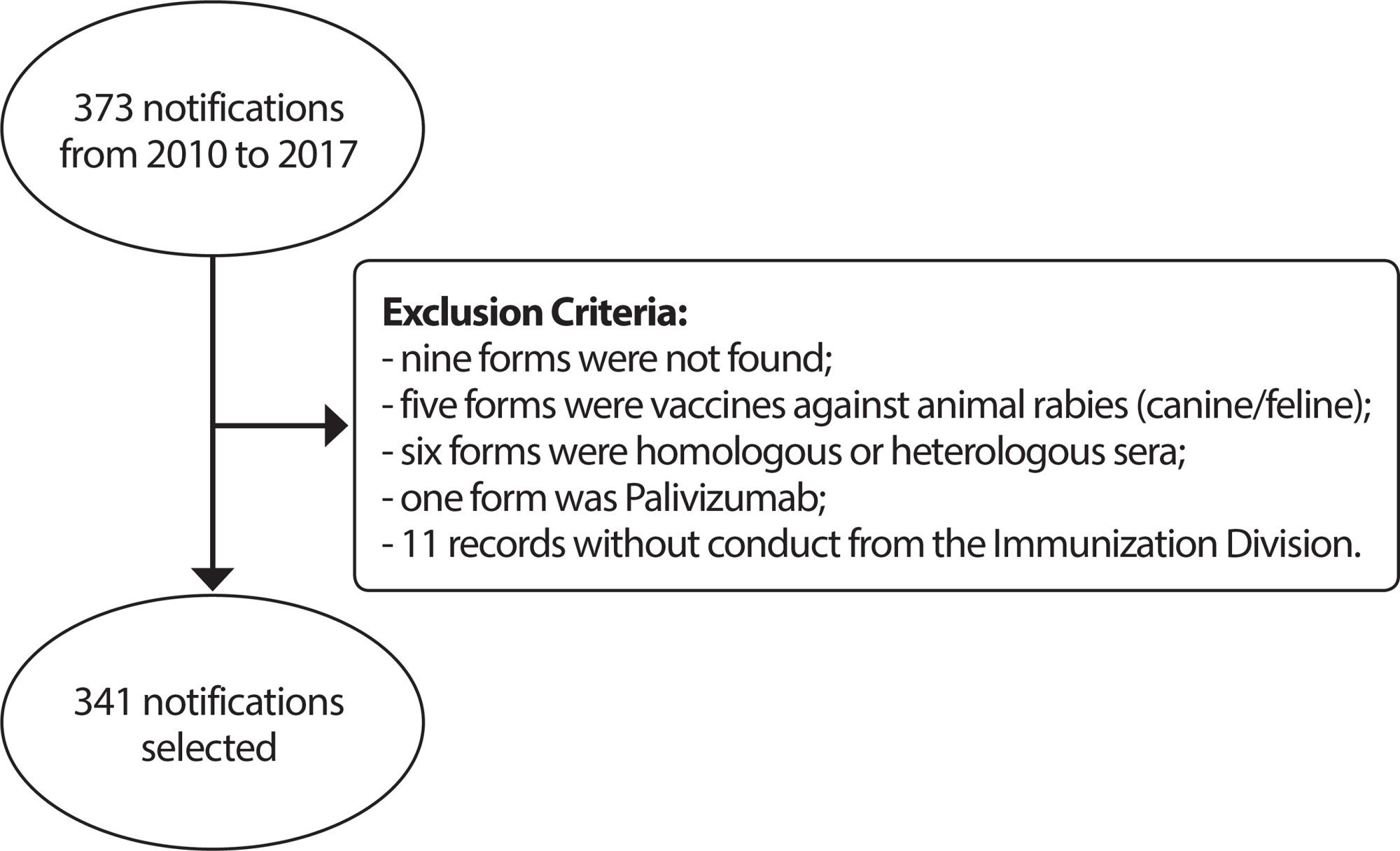
-
ORIGINAL ARTICLE09-26-2022
Participatory development of educational technology in seeking patient safety in maternity hospitals
Revista Brasileira de Enfermagem. 2022;75(5):e20210701
Abstract
ORIGINAL ARTICLEParticipatory development of educational technology in seeking patient safety in maternity hospitals
Revista Brasileira de Enfermagem. 2022;75(5):e20210701
DOI 10.1590/0034-7167-2021-0701
Views1See moreABSTRACT
Objectives:
to develop a booklet as an educational technology, together with health professionals, patients and companions, aiming at their involvement in patient safety in maternity hospitals.
Methods:
a qualitative convergent care study, carried out in three stages at a maternity hospital in Belo Horizonte. The booklet construction took place between February and April 2021, with 13 professionals, 06 companions and 11 patients.
Results:
data content analysis was performed, creating three categories: Knowledge and experiences about patient and newborn safety in maternity hospitals; Challenges for involving patient and companion in safety actions; Assessment of patients, companions and professionals on the booklet construction process. The booklet construction involved the participation of health professionals, users and companions in all stages of the process.
Final considerations:
the participatory process enabled the creation of educational technology for the involvement of patients and companions in patient safety actions.
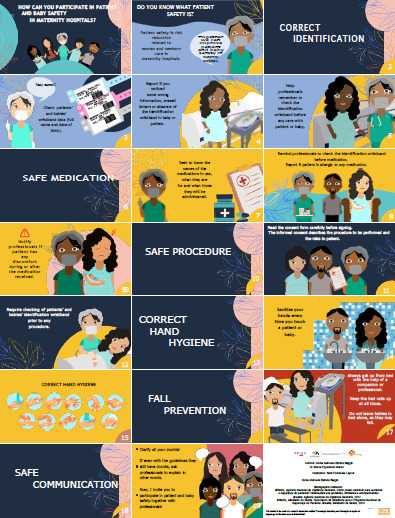
-
12-08-2023
Nursing experiences in specialized services in child and adolescent mental health: a systematic review of qualitative studies
Revista Brasileira de Enfermagem. 2023;76:e20220550
Abstract
Nursing experiences in specialized services in child and adolescent mental health: a systematic review of qualitative studies
Revista Brasileira de Enfermagem. 2023;76:e20220550
DOI 10.1590/0034-7167-2022-0550
Views1See moreABSTRACT
Objective:
to synthesize evidence from qualitative studies on nursing experiences regarding child and adolescent mental health care in specialized services.
Method:
a systematic review with meta-synthesis of qualitative studies according to JBI guidelines. CINAHL, EMBASE, MEDLINE, LILACS, PSYCinfo, Scopus and Web of Science databases were used. The findings were classified according to the level of reliability and credibility and categorized by similarity between contents.
Results:
229 articles were identified, and five were included in the final sample and organized into the categories: Emotional impact; and Understanding nursing role. The level of evidence found was moderate.
Final considerations:
nursing experiences are permeated by emotional exhaustion, feelings of frustration and difficulty in understanding their professional role. The need for training spaces that qualify this care is highlighted.

-
ORIGINAL ARTICLE07-19-2024
Validation of an instrument for assessing leprosy care in children and adolescents
Revista Brasileira de Enfermagem. 2024;77(2):e20230344
Abstract
ORIGINAL ARTICLEValidation of an instrument for assessing leprosy care in children and adolescents
Revista Brasileira de Enfermagem. 2024;77(2):e20230344
DOI 10.1590/0034-7167-2023-0344
Views1See moreABSTRACT
Objectives:
to validate the content of an instrument for assessing leprosy care in individuals under 15 years old in the context of Primary Health Care.
Methods:
methodological study of content validation, based on the evaluation of essential and derived attributes in primary care, in the professional version. For data analysis, the Content Validation Index (CVI ≥ 0.8) and Cronbach’s Alpha were calculated.
Results:
a higher percentage of judges among nurses (61.5%) was observed; with a doctorate (46.2%), and engaged in teaching and research (77%). The overall Content Validation Index of the instrument was 0.98. In the analysis of Cronbach’s Alpha of the instrument, the assigned value was 0.717.
Conclusions:
the instrument represents an advancement in the measurement of health evaluation policies and can significantly contribute to improving the quality of care provided to children and adolescents with leprosy.
-
07-05-2021
Selenium concentrations in elderly people with Alzheimer’s disease: a cross-sectional study with control group
Revista Brasileira de Enfermagem. 2021;74:e20200984
Abstract
Selenium concentrations in elderly people with Alzheimer’s disease: a cross-sectional study with control group
Revista Brasileira de Enfermagem. 2021;74:e20200984
DOI 10.1590/0034-7167-2020-0984
Views0See moreABSTRACT
Objective:
To investigate possible differences in plasma and erythrocyte concentrations of selenium among elderly with and without a diagnosis of Alzheimer’s disease (AD).
Methods:
Cross-sectional study, performed with an elderly group with Alzheimer’s disease, diagnosed by a geriatric doctor, and compared to an elderly group without the disease, equaling gender, education, and age. Atomic absorption spectrophotometry determined plasma and erythrocyte concentrations of total selenium (Set).
Results:
The mean age was 74.41±7.1 years in the Alzheimer’s disease group and 71.46±5.1 years among the control group. The Alzheimer’s disease group presented lower plasma concentrations (mean of 45.29±14.51 µg/dL vs. 55.14±14.01 µg/dL; p=0.004), and erythrocyte Set (median of 56.36 µg/L vs. 76.96 µg/L; p<0.001). The logistic regression model indicated an association between erythrocyte Set concentrations and diagnosis of Alzheimer’s disease (p=0.028).
Conclusion:
Elderly with Alzheimer’s disease present lower selenium concentrations in the evaluated organic compartments.
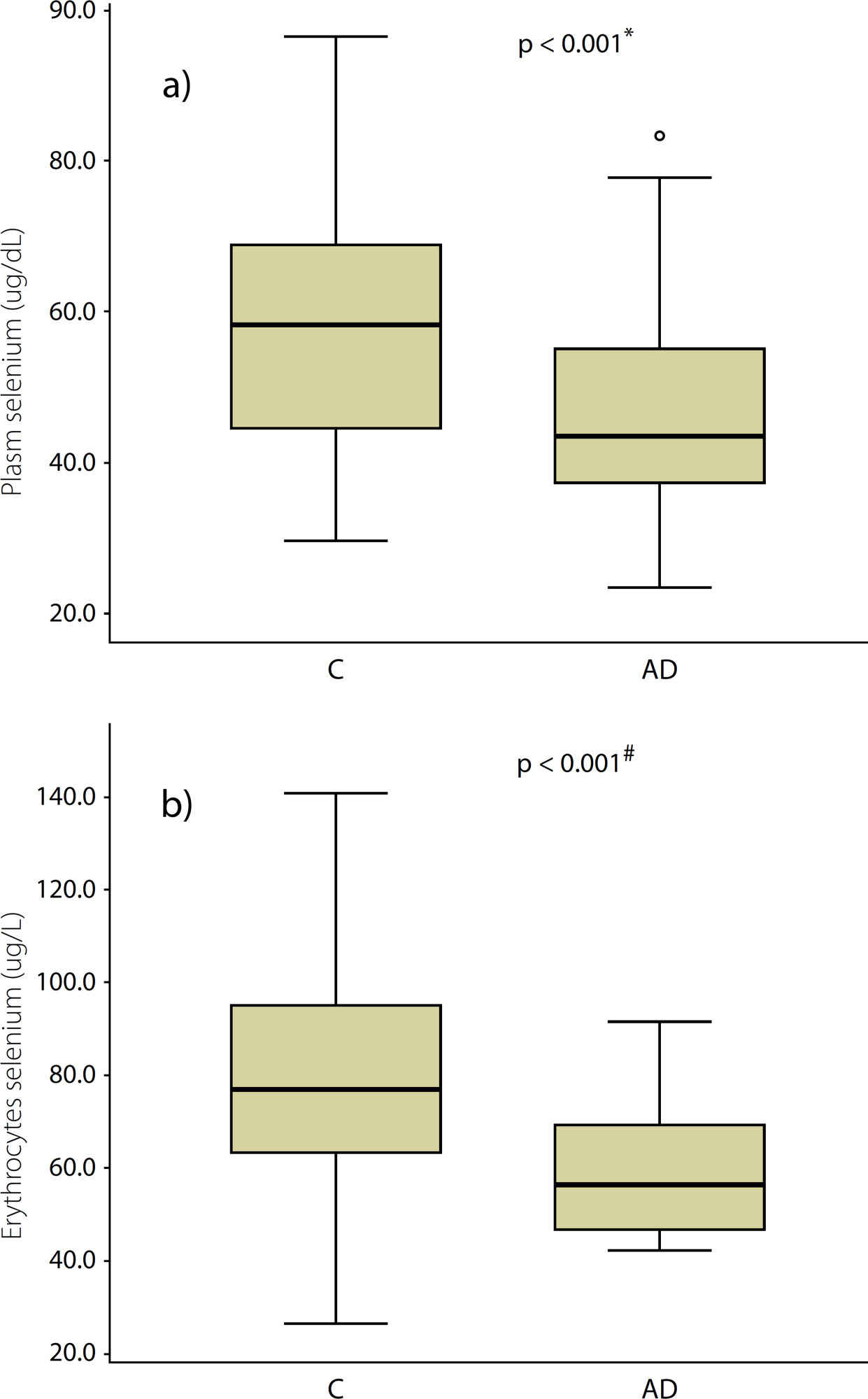
-
ORIGINAL ARTICLE12-13-2019
Hammock and nesting in preterm infants: randomized controlled trial
Revista Brasileira de Enfermagem. 2019;72:96-102
Abstract
ORIGINAL ARTICLEHammock and nesting in preterm infants: randomized controlled trial
Revista Brasileira de Enfermagem. 2019;72:96-102
DOI 10.1590/0034-7167-2018-0099
Views0See moreABSTRACT
Objective:
To compare the physiological variables and the sleep-wake pattern presented by preterm in nesting and hammock positions after diaper change.
Method:
This is a crossover randomized controlled trial. It was conducted with 20 preterm infants who, after diaper change, were placed in nests or hammocks. These preterm infants were evaluated for physiological variables (heart rate and oxygen saturation) and behavioral variables (sleep and wakefulness).
Results:
There was no statistically significant difference in the studied variables between nesting and hammock positions. However, regarding the categorical variable sleep, the comparison between the research phases for the hammock position showed differences between the baseline phase and the immediate recovery (p=0.00), baseline and late recovery (p=0.00), response and immediate recovery (p=0.00), response and late recovery (p=0.00).
Conclusion:
No differences were identified between the nest and the hammock; however, the use of the hammock favored the sleep of preterm infants compared to its non-use.

-
12-05-2019
Hospital care and urinary incontinence in the elderly
Revista Brasileira de Enfermagem. 2019;72:284-293
Abstract
Hospital care and urinary incontinence in the elderly
Revista Brasileira de Enfermagem. 2019;72:284-293
DOI 10.1590/0034-7167-2018-0273
Views0See moreABSTRACT
Objective:
to identify factors inherent in hospital care that favor urinary incontinence in the elderly.
Method:
an integrative review with Scopus, CINAHL and Pubmed searches. Includes original articles, no language restriction, published between 2008 and 2018. Rated level of recommendation and level of evidence were assessed using the Oxford Center for Evidence-Based Medicine classification. Exploited content through thematic analysis in light of the Donabedian model.
Results:
13 articles constituted the sample. There were factors such as the unjustified and indiscriminate use of devices such as the geriatric diaper; hospital structure adversely affecting the needs of the elderly; and deficit in screening, risk identification and underreporting of the problem favor urinary incontinence in the hospitalized elderly.
Conclusion:
modifiable factors related to hospital structures and care processes favor both the onset and worsening of urinary incontinence in the elderly.
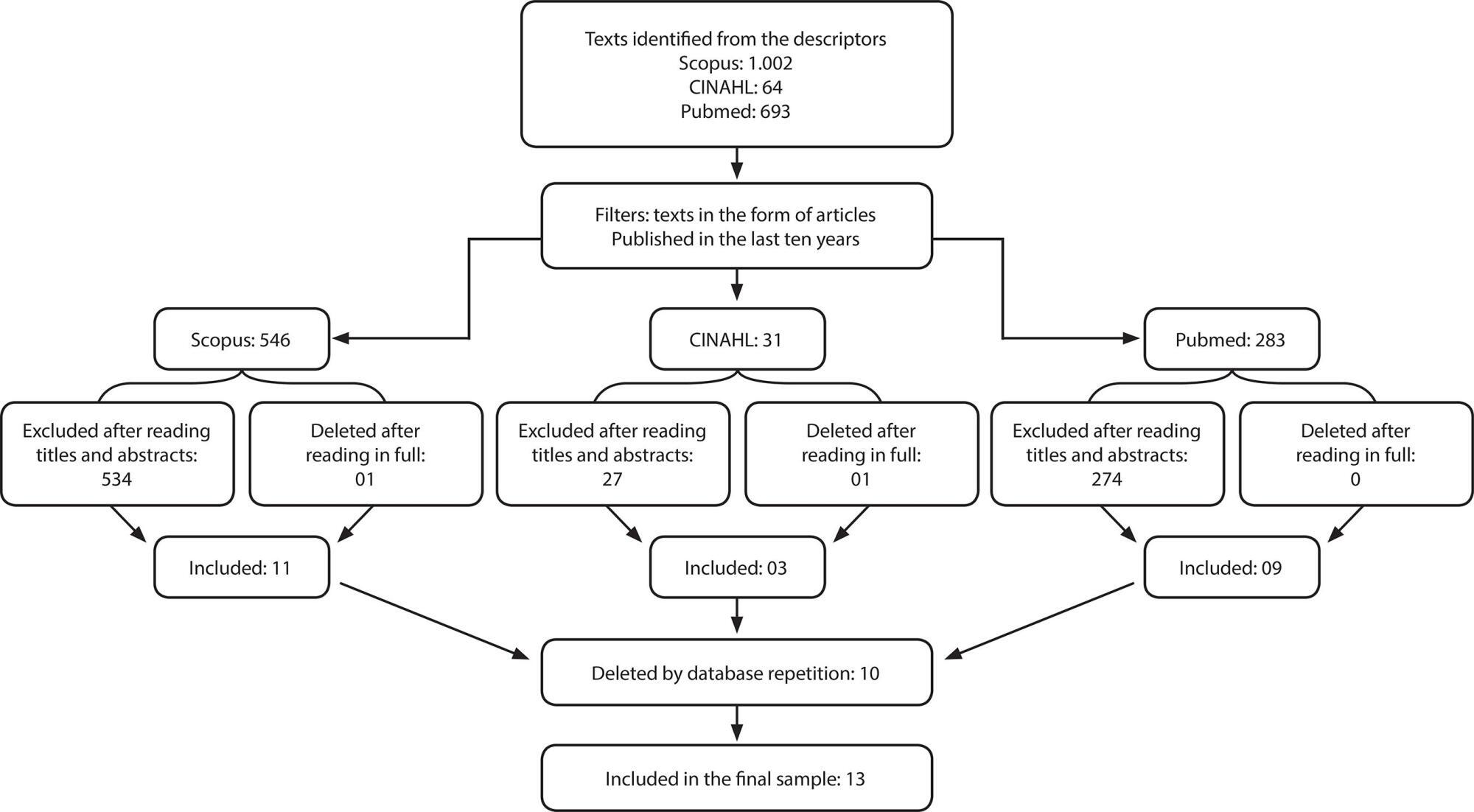
-
04-14-2021
Child behavior during the social distancing in the COVID-19 pandemic
Revista Brasileira de Enfermagem. 2021;74:e20200762
Abstract
Child behavior during the social distancing in the COVID-19 pandemic
Revista Brasileira de Enfermagem. 2021;74:e20200762
DOI 10.1590/0034-7167-2020-0762
Views0See moreABSTRACT
Objective:
To describe the daily activities performed by children from 6 to 12 years of age incomplete and analyze children’s behavior during social distancing in the face of the COVID-19 pandemic.
Methods:
Cross-sectional study with children in a learning stage living in Brazil. The data were collected via online form. Fisher’s exact test was applied to analyze the association of categorical variables with child behavior; when significant, it was used the odds ratio. It was considered results considered statistically significant those presenting values of p < 0.05.
Results:
Data from 530 children were analyzed: 50.3% female, 71.3% from the Southeast Region, 73% in fulltime social distancing, 52% presented anxiety, which was significantly associated with changes in sleep and appetite.
Conclusion:
The results indicate the need for parents/caretakers to stimulate moments for the child to express themselves, not minimizing their feelings and providing emotional support to mitigate the negative impact of these feelings on the child’s mental and physical health.
-
ORIGINAL ARTICLE09-21-2020
Prevalence of xerostomia in women during breast cancer chemotherapy
Revista Brasileira de Enfermagem. 2020;73:e20190785
Abstract
ORIGINAL ARTICLEPrevalence of xerostomia in women during breast cancer chemotherapy
Revista Brasileira de Enfermagem. 2020;73:e20190785
DOI 10.1590/0034-7167-2019-0785
Views0See moreABSTRACT
Objective:
To identify the prevalence of xerostomia in women undergoing chemotherapy for breast cancer.
Method:
Prospective cohort with 27 women who underwent up to 16 sessions of intravenous chemotherapy. Data collection was performed at the outpatient clinic of a university hospital in the city of São Paulo, where two forms were applied before the start of treatment and the Xerostomia Inventory before and after each chemotherapy session.
Results:
Complaints of dry mouth were present in 48.1% of women before chemotherapy, and they were approximately 28 times more likely to develop dry mouth during treatment. It was observed that the use of antiemetics contributed to the occurrence of xerostomia, and the anti-ulcerous were presented as a protective factor.
Conclusion:
The study identified both a high prevalence of xerostomia regardless of the chemotherapy used and the need to create protocols to improve the quality of life of these patients.
-
ORIGINAL ARTICLE10-21-2019
Educational hypermedia in nursing assistance at birth: building and validation of content and appearance
Revista Brasileira de Enfermagem. 2019;72(6):1471-1478
Abstract
ORIGINAL ARTICLEEducational hypermedia in nursing assistance at birth: building and validation of content and appearance
Revista Brasileira de Enfermagem. 2019;72(6):1471-1478
DOI 10.1590/0034-7167/2018-0163
Views0See moreABSTRACT
Objective:
to build an educational hypermedia about nursing care at usual risk birth and to perform validation of content and appearance.
Method:
methodological research carried out following the following stages: content and planning of modules; media production and organization of tutorial units; organization of student space, tutor and communication between them; availability of hypermedia; assessment by experts in nursing and informatics; and implementation of proposed suggestions.
Results:
educational hypermedia showed to be a validated material, since it presented an optimum index of global content of 0.97 and statistical significance in the binomial test for the content and appearance.
Conclusion:
it is believed that the use of this material with undergraduate students in nursing will contribute to the quality of obstetric care, considering that it is an illustrated technology capable of favoring teaching-learning about normal humanized childbirth.
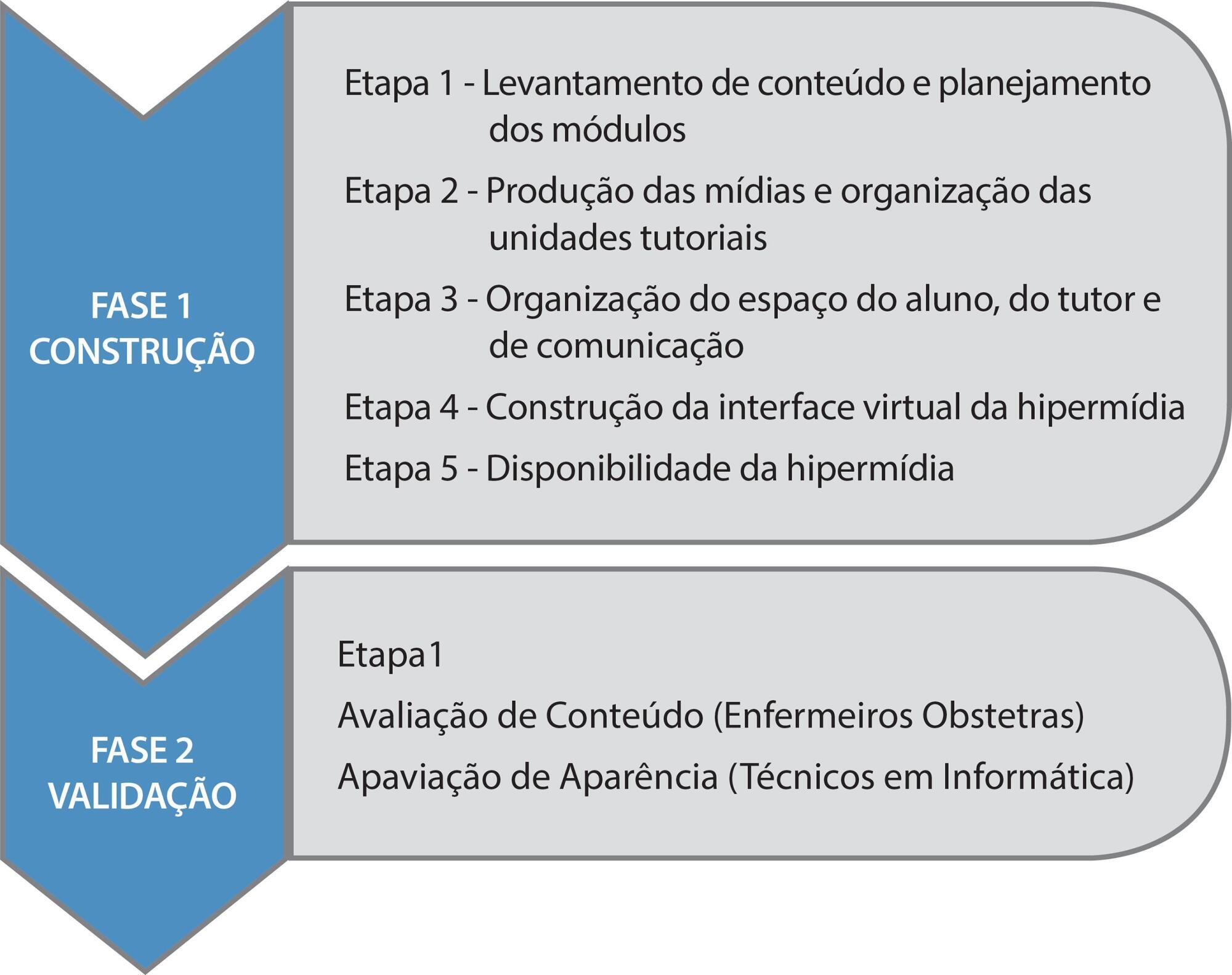
-
REFLECTION06-29-2020
Recommendations in covid-19 times: a view for home care
Revista Brasileira de Enfermagem. 2020;73:e20200310
Abstract
REFLECTIONRecommendations in covid-19 times: a view for home care
Revista Brasileira de Enfermagem. 2020;73:e20200310
DOI 10.1590/0034-7167-2020-0310
Views0See moreABSTRACT
Objective:
To suggest recommendations for the practice of Home Nursing in the context of COVID-19.
Method:
Reflective study, originated from readings associated with the theme, available in current guidelines from the Pan American Health Organization, World Health Organization and the Ministry of Health.
Results:
Recommendations were developed from current scientific evidence for prevention of infections, control of epidemics and pandemics in the Brazilian home scenario.
Final considerations:
the reflections achieved contribute to guiding actions for better assistance to the patient, family caregivers and the community in the perspective of safe home care with COVID-19, and it is characterized as an introductory discussion on the theme, encouraging new studies to be carried out from the unfolding of the current scenario.
-
04-14-2021
Emotional labor of nurses in the front line against the COVID-19 pandemic
Revista Brasileira de Enfermagem. 2021;74:e20200660
Abstract
Emotional labor of nurses in the front line against the COVID-19 pandemic
Revista Brasileira de Enfermagem. 2021;74:e20200660
DOI 10.1590/0034-7167-2020-0660
Views1See moreABSTRACT
Objective:
To analyze nurses’ experiences in the front line of the fight against the COVID-19 pandemic regarding the performance of emotional labor (EL), aiming at its characterization and identification of support strategies and development opportunities of nurses and practices.
Methods:
Qualitative, descriptive, and exploratory study, with content analysis of eleven written narratives and reports from a focus group composed of nurses with experience in caring for patients with COVID-19 from different Hospital Centers in Lisbon, Portugal.
Results:
Five themes were extracted: 1) Challenges experienced by nurses in the frontline; 2) Emotions experienced by nurses in service care; 3) Emotional responses of nurses and patients: impact on care; 4) EL of nurses in the patient care process; 5) Opportunities for development in the face of the emotional challenge required of nurses in combating COVID-19.
Final considerations:
The nurses demonstrated the ability to transform this profoundly emotional experience positively.

Search
Search in:
Nuvem de Tags
Adolescente (85) Atenção Primária à Saúde (239) COVID-19 (91) Criança (91) Cuidados de Enfermagem (269) Educação em Enfermagem (151) Educação em Saúde (139) Enfermagem (930) Enfermagem Pediátrica (86) Estudantes de Enfermagem (77) Estudos de Validação (131) Família (87) Idoso (208) Promoção da Saúde (99) Qualidade de Vida (104) Saúde do Trabalhador (86) Saúde Mental (145) Saúde Pública (82) Segurança do Paciente (150) Tecnologia Educacional (100)



